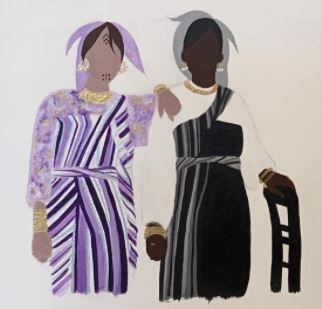By Faiza Ramadan.
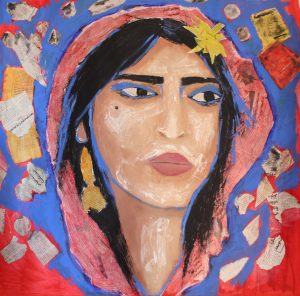
International Women’s Day is celebrated every year to not only commemorate the work that women are doing; but also to shed light on the challenges they face and the opportunities they could explore. More importantly, it is a reminder of the work that remains to be done for gender equality to be the normalized equilibrium.
This is not a reality experienced only in Libya. Women all over the world continue to experience challenges in their daily lives. Women continue to be marginalized and fought for demanding protection for their rights.
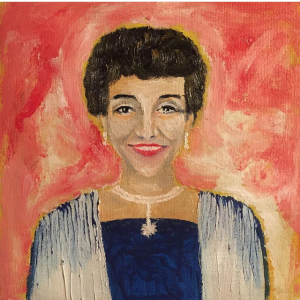
”I personally admire her elegance, beauty and class” (By Faiza Ramadan).
The situation for women in Libya, as it is in many other parts of the world, is part of various systems of oppression. Political, economic and social systems of oppression put women in a difficult trapped place.
However, since the 2011 uprising, we have seen Libyan women taking more roles in creating social, culture and economic changes. We see more women in media, arts and entrepreneurship. As artists we do our part by being part of the narrative and creating an impact by changing general perspective. However, we are faced with challenges and it has not been an easy journey. I believe our main challenge is the societal mindset and public opinion on women’s success. These challenges can be changed gradually. We just have to keep doing what we do and make our voices heard.
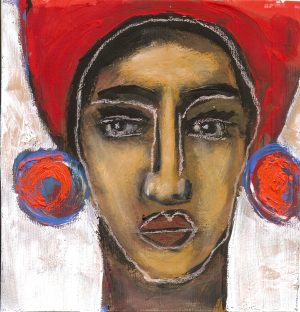
The artistic scene in Libya has emerged quickly post the revolution. Many galleries and art foundations are being established by Libyan women. De-Orientalizing art is one of them. De-Orientalizing Art is a social enterprise that provides a safe multidimensional platform for Libyan female artists to foster women empowerment and cultural connectivity. By providing a commercial base for female artists to sell their artwork in the United States, artists enjoy global exposure and hence normalization of their presence in a space that may have been male-dominated. Through this platform, artists engage in discussions about identity, collective memory, conflict and the role of art to create change.
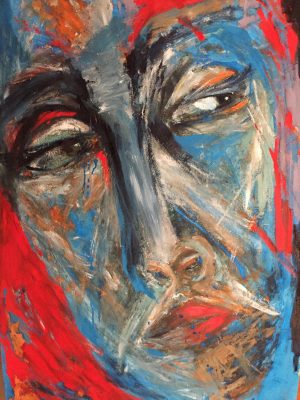
As a woman artist, we have a role to play in society and own the narrative and issues by using our creative voice and power. I started practicing art professionally since the 2011 uprising. The event ignited a passion in me to use art in a form of expression and it inspired me to express myself as a woman and a Libya.
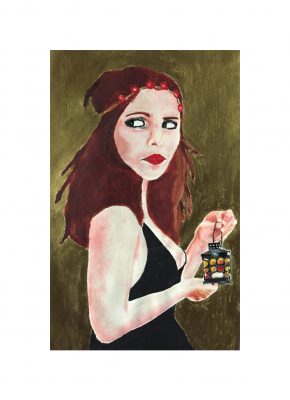
Personally, painting is psychological therapy to cope with uncertainty and challenges that affect us by the political and economic instability in the country. I want my practice to inspire and impact and change the misconceived perceptions on Libyan women and encourage future generations to continue to do what they are passionate about.
I am a Libyan Ghanaian self-taught artist based in Tripoli. The influences of my surroundings can be always seen in my work. Postmodern, expressive and portrait representations of Libyan icons and pan-African hopes are found in my paintings as well as reflections on global pop culture.
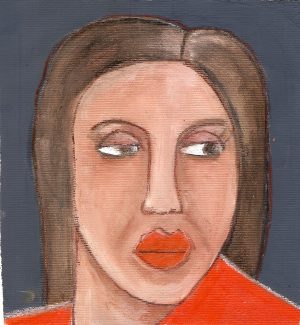
In 2017, I was selected as one of the artists to participate in the festival “pour le libye” in Tunis, which was hosted by the French Institute and Embassy to Libya. My works were also exhibited, in the same year, at Waraq Art Foundation, an exhibition called “Warning” which represents the grim reality of post revolution in Libya.
Faiza Ramadan is a Libyan Ghanaian self-taught artist based in Tripoli. She reports that her work is influenced by Postmodern, expressive and portrait representations of Libyan icons and pan-African hopes as well as reflections on global pop culture, are found in her paintings.
The views in this article do not necessarily reflect those of Libya Herald.
This article was contributed by the writer as part of a series of pieces by several Libyan females, in and outside Libya, invited by Libya Herald to reflect on International Women’s Day – ten years on from Libya’s 2011 February revolution.
Op-Ed: Libyan Women; The Guardians of Tradition | (libyaherald.com)
Op-Ed: International Women’s Day: Will Libya’s new government honour its women? | (libyaherald.com)
Op-Ed: Libyan women: A tale of persistence | (libyaherald.com)
Op-Ed: Enough Tokenism: Its Time to Demand Meaningful Inclusion! | (libyaherald.com)
Abd Alhamid Aldabaiba’s GNU: Not women friendly? | (libyaherald.com)







